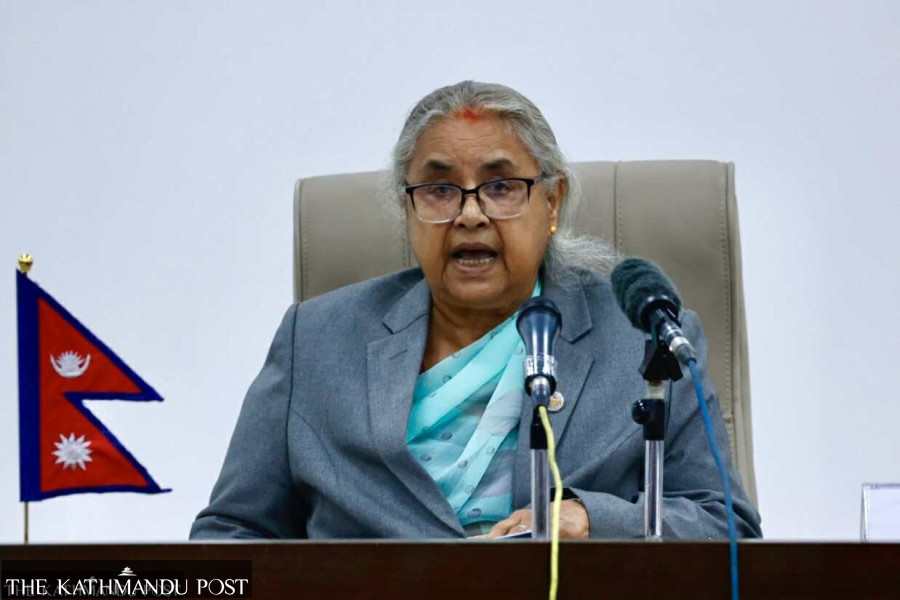National
Provinces complain of snub by Karki-led interim government
Provincial ministers rue ‘unilateral’ budget freeze. Say lack of collaboration hinders preparations for March elections.
Binod Ghimire
Lumbini Chief Minister Chet Narayan Acharya on Saturday complained that the federal government’s move to freeze the budget has affected development projects in the province.
He said projects directly related to the public, such as roadways, drinking water, and urban development, have come to a complete halt after the decision. Addressing a party function, Acharya, a CPN-UML leader, said people’s aspirations for development and a better life cannot be addressed by stopping the budget.
“We have been told not to proceed with any development project. How long will this continue, we are not sure,” he said.
A few days after assuming office, Finance Minister Rameshore Khanal decided to halt various small projects totalling Rs120 billion as part of austerity measures to fund post Gen Z protest recovery. He decided to scrap poorly prepared and fragmented projects and introduce strict measures to control wasteful spending.
Like Lumbini’s chief minister, most provincial governments are unhappy with the budget cut. Further, they complain that the decisions were taken without any consultation.
“We have no formal communication with the new federal government,” said Ghanashyam Bhandari, minister for social development in Karnali Province. “We understand that the prime minister is busy and still working to give full shape to her Cabinet. However, we expect some consultations before taking the decisions that directly affect the functioning of provincial governments.”
Bhandari said his ministry needs to coordinate with at least three ministries—education, youth and sports, and labour—at the federal level. However, there has been no communication since the formation of the interim government on September 12.
The two-day anti-corruption protests in the second week of September ousted the KP Sharma Oli government. Over 70 people have lost their lives since the protests as many injured died in hospitals over several days. On September 12, the interim government led by Sushila Karki, a retired chief justice, was constituted as per the agitators’ demands.
However, as the anti-corruption agitation was primarily targeted against the federal government, the provincial governments led by different political parties continue to function even as several infrastructures under them were destroyed in arson.
Officials in provincial governments say they feel ignored by the ‘non-political government’ in Kathmandu. In case of any coordination issues, provincial ministers would directly talk to the respective ministers at the federal level, even when there were no formal meetings. The same applied to federal ministers.
Provincial ministers say the Karki government must also realise that Nepal’s federalism is based on cooperation, coordination and coexistence between all tiers of government, as envisioned in the constitution. Stopping communication means violating these principles.
Hira Sarki, the internal affairs minister of Sudurpaschim Province, said lack of proper communication with the federal government has hit them hard. Several of the government infrastructures in the province, including ministries, other offices, and the provincial assembly, were destroyed in arson attacks on September 9.
Sarki said the federal government has asked them to carry out only repair and maintenance on properties that cost up to Rs1 million. However, most structures have been severely damaged, which demands much more than the sanctioned amount.
“We are clueless when the reconstruction of damaged and destroyed infrastructure will start and how,” he said. “It would have been easier to plan had there been communication to this effect.”
Provincial governments claim it is not just about repairing and maintaining the properties destroyed during the protest; the federal government has not even bothered to discuss election preparations. On September 12, under Karki’s recommendation, President Ramchandra Paudel dissolved the House of Representatives and announced snap polls for March 5 next year.
While the Election Commission has the constitutional responsibility to hold the elections in coordination with the federal government, collaboration with provincial governments is necessary for election security.
The protesters not only torched and vandalised police stations across the country but also looted arms and uniforms. “There are concerns about security arrangements in order to ensure free and fair elections. But the federal government has not consulted us even once for this purpose,” said Sarki. “The interim government’s attitude gives us room to doubt its intent to hold timely elections.”




 10.12°C Kathmandu
10.12°C Kathmandu















